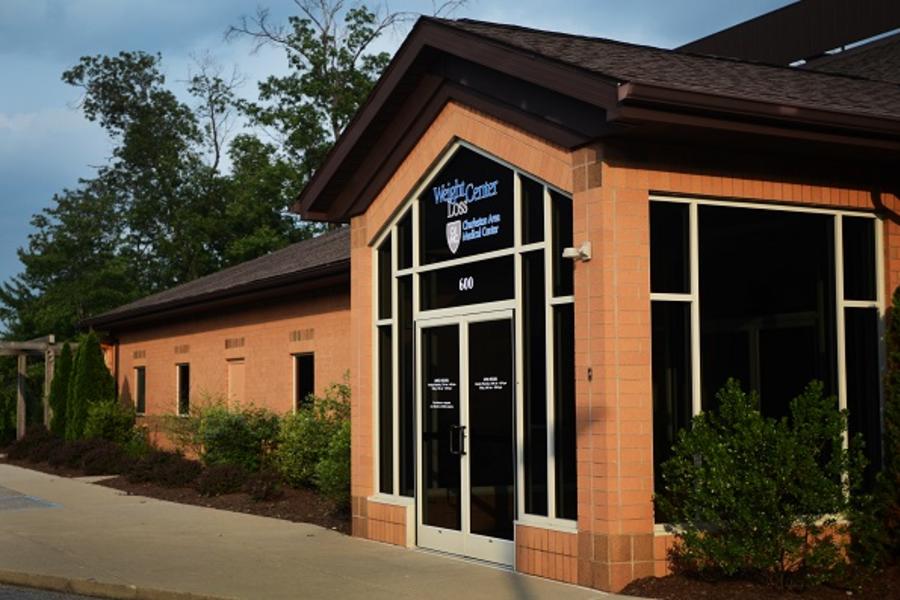Our Approach to Gastric Bypass Surgery
The gastric bypass is both a restrictive and a malabsorptive procedure and is the current gold standard in weight loss surgery in the U.S.
This surgery achieves its effects by creating a small stomach pouch about the size of your thumb. The rest of the stomach is permanently separated from the new pouch. The small intestine is cut below the stomach at the jejunum and is rearranged to provide an outlet from the new stomach pouch to the jejunum. The other end is connected into the side of the Roux limb of the intestine, creating the “Y” shape that gives the technique its name. In this way, the flow of digestive juices from the lower stomach is maintained. Bile and digestive juices are still released from the old stomach and travel down the duodenum and into the jejunum at the new connection.
The new anatomy restricts the type and amount of food consumed and absorbed. The gastric bypass provides a tool with which you can potentially lose a substantial amount of excess body weight, as long as you are motivated to maintain life-style changes, healthier eating habits and regular exercise.
Advantages Of Roux-en-y Gastric Bypass
Most patients lose weight quickly and continue to lose for 18 to 24 months after the procedure. With the Roux-en-Y gastric bypass, many patients maintain a weight loss of 60 to 70 percent of their excess weight for 10 years or more. Because combined operations result in greater weight loss than restrictive operations, they may also be more effective in improving the health problems associated with severe obesity, such as hypertension (high blood pressure), sleep apnea, type 2 diabetes, and osteoarthritis.
Disadvantages of Roux-en-y Gastric Bypass
Combined procedures are more difficult to perform than the restrictive procedures. They are also more likely to result in long-term nutritional deficiencies. This is because the operation causes food to bypass the duodenum and jejunum, where most iron and calcium are absorbed. Menstruating women may develop anemia because not enough vitamin B12 and iron are absorbed. Decreased absorption of calcium may also bring on osteoporosis and related bone diseases. Patients must take nutritional supplements that usually prevent these deficiencies.
RGB operations may also cause Dumping Syndrome an unpleasant reaction that can occur after a meal high in simple carbohydrates, which contain sugars that are rapidly absorbed by the body. Stomach contents move too quickly through the small intestine, causing symptoms such as nausea, bloating, abdominal pain, weakness, sweating, faintness, and sometimes diarrhea after eating.
Risks of Roux-en-Y Gastric Bypass
Risks common to all surgeries for weight loss include an infection in the incision, a leak from the stomach into the abdominal cavity or where the intestine is connected (resulting in an infection called (peritonitis), and a blood clot in the lung (pulmonary embolism). About one-third of all people having surgery for obesity develop gallstones or a nutritional deficiency condition such as anemia or osteoporosis. Fewer than 3 in 200 (1.5%) people die after surgery for weight loss.
- An iron and vitamin B12 deficiency occurs more than 30% of the time. About 50% of those with an iron deficiency develop anemia.
- The connection between the stomach and the intestines narrows 5% to 15% of the time, leading to nausea and vomiting after eating.
- Ulcers develop 5% to 15% of the time.
- The staples may pull loose.
- Hernia may develop
- The bypassed stomach may enlarge, resulting in hiccups and bloating

West Virginia’s Weight Loss Specialists
Our bariatric surgeons are experts in a variety of weight loss surgery techniques.
Am I A Candidate for Weight Loss Surgery?
To find out if you are a candidate for weight loss surgery, answer the nine questions below.
- Do you have a body mass index (BMI) greater or equal to 35 with one or more significant obesity related condition including high blood pressure, diabetes, arthritis, sleep apnea, and high cholesterol? OR Do you have a BMI greater than 40, regardless of other medical conditions?
- Are you 16-70 years of age? (some exceptions)
- Do you understand and accept the operative risks?
- Have you failed attempts with diet plans, and behavioral and medical therapy?
- Do you have realistic weight loss expectations and are motivated to make lifestyle changes?
- Are you capable of understanding the procedure and implications?
- Can you make a commitment to follow the post-surgical diet, vitamin supplementation, exercise program, and medical follow-up necessary for health and weight maintenance?
- Are you free of any psychiatric illnesses, substance or alcohol abuse that may prevent you from being able to safely undergo surgery?
- Have you been obese for the last 5 years?
If you answered yes to all of the above questions, you may be a candidate for weight loss surgery. If you did not answer yes to all of the questions, you may be better suited to our medical weight loss program.
Weight Loss Surgery - What to Expect
Learn more about the process of weight loss surgery before, during and after your procedure.
Attend our Free Seminar
It is mandatory before scheduling an appointment that you attend one of our free educational seminars. The seminars are presented by Dr. Shin himself and will answer many of your questions regarding details of both the Lap Band and Gastric Bypass surgery.Educational Seminar Schedule
Review your Insurance Policy
While our facility is willing to assist you with the insurance process, it is your responsibility to contact your insurance company and verify that you have coverage for the procedure. You may also check the "Exclusion of Coverage" or "Certificate of Coverage" section for mention of a specific weight loss surgery option.
Complete Supervised Weight Loss Program Specified by Insurance
Most insurance companies currently require documentation of previous weight loss attempts that have been supervised by a primary care physician or other medical professional. Your insurance may require you to complete anywhere from 3-12 months of supervised weight loss within the last 2-5 years prior to insurance approval. If you have been working with your physician, you will be asked to submit a copy of the records to the Weight Loss Center so they can be submitted to your insurance company. If you are required to complete supervised weight loss but have not started this process, you may be eligible to participate in the CAMC Medical Weight Loss Prior to Surgery Program.
These records must include the following information:
- Documentation should include physician or other professional signatures, address and phone number and preferably would be printed on physician letterhead.
- The diet plan you are currently following (Low fat, Weight Watchers, South Beach, etc.).
- Your weight must be recorded at each visit
- Recommendations for behavioral or lifestyle modifications
- Current exercise plan and recommendations
- Proof of weight loss during supervised weight loss program
- Medications used
Complete the Letter of Intent
Prior to proceeding with a weight loss surgery, you are asked to submit a letter of intent to the Weight Loss Center, as part of the pre-surgical screening process. This letter will become part of your CAMC medical file. Please type your letter and submit this with the patient packet at your initial visit to the Weight Loss Center
This letter should include the following:
Your reasons for considering weight loss surgery.
Your expectations for the outcome after your surgery.
Your knowledge and understanding about the surgical procedure.
Your understanding and motivation regarding the recommended lifestyle, diet and exercise changes after your weight loss surgery.
A description of how you will get social support. (family, friends, etc)
Your signature, printed name and the date
Complete the Consent Form
If your insurance company requires prior authorization, you will need to fill out a consent form allowing your doctor’s office to release information about your condition to your insurance company.
Complete the Patient Worksheet
The Weight Loss Center Patient Packet is included in the educational materials issued at the Educational Seminar. These forms are also available online. It is necessary that you bring this information with you to your initial visit at the Weight Loss Center. This information will also be used in your insurance submission.
Obtain Copies of Medical Records
It is beneficial if you obtain copies of medical records, including physician referrals of your primary care physician as well as other healthcare professionals who have treated you for obesity and related conditions. The Weight Loss Center cannot gather, copy or organize these documents for you.
Documentation of your treatment for the following conditions may be required:
- Type 2 Diabetes
- High Blood Pressure
- Sleep Apnea
- Asthma
- Joint Problems
Attendance of one support group meeting
Prior to the weight loss surgery being performed, it is mandatory to attend one surgical support group meeting so you can talk to those who have undergone weight loss surgery and get an idea of what you can expect.
Physician/Nurse consultation
You will meet with the physician and the nurse the same day as a new patient. A consultation is first completed with the nurse prior to meeting with the physician.
During the consultation with the nurse, an extensive medical history background will be taken. Past and present medical conditions will be reviewed. A list of current medications will be needed. The nurse will be screening for current tobacco and alcohol use. The nurse will also discuss any past surgeries and any known drug allergies. During the initial visit, the nurse will discuss any past history with dieting, diet pills or exercise programs you may have tried in the past. A complete head to toe physical will be completed by the nurse and a brief overview of the surgery will be discussed.
You then will meet with the physician. The physician will review all medical history previously obtained by the nurse. The physician will discuss the surgical procedure in great detail and discuss the risks and alternatives to the surgical procedure. Any questions you may have regarding the surgery will be answered in detail per the physician.
Nutritional Screening
A consultation with a registered dietitian is part of the necessary documentation required for surgical authorization. At this appointment, the dietitian will be screening for any dietary behaviors and habits that may interfere with your abilities to follow the postoperative dietary guidelines.
The dietitian will also set you up with a meal plan that will help you to begin making the dietary and behavioral changes necessary to successfully lose weight following surgery.
Psychological screening
A consultation with a licensed psychologist is required prior to surgical authorization.
This visit includes a complete psychological testing and involves completion of:
Preoperative teaching
Preoperative teaching is completed in our office usually 7-14 days prior to surgery. During the preoperative teaching visit, you will meet with the nurse only. This visit usually takes about an hour to complete. An extensive review of the surgical procedure is discussed the patient. Family members or support people are welcome to come and take part in this educational session as well. The risks, benefits and alternatives to the surgery are reviewed. Patients are made aware of expectations while in hospital and after discharged home. An appropriate amount of time is allotted to ask questions if needed.
Preadmission testing
Preadmission testing will be completed anywhere from 7-14 days prior to your scheduled surgery date – usually the same day as your preoperative teaching that is completed in our office. Preadmission testing (PAT) is completed at CAMC General Hospital.
Preadmission testing includes; Lab work (CBC, CMP, PT/INR, PTT, urine pregnancy test), EKG (if not recently completed within last 6 months) and possibly a chest x-ray after reviewing your pulmonary medical history. During PAT, you will also meet with the anesthesiologist.
You will be expected to arrive at General Hospital the day of your surgery two hours prior to the actual surgery time.
After surgery, you will then be transferred to the bariatric unit. This is where you will stay until you are discharged home from the hospital.
During your hospital stay, you will be on the Phase 1 diet. Expected hospital stay will be one night for Adjustable Gastric Banding patients and two – three nights for Roux-en-Y Gastric Bypass and Sleeve Gastrectomy patients. Before being discharged, you will be educated on the Phase 2 Diet, how to maintain proper incision care, your 7-10 day post-op follow up appointment that will be in our office, physician will also discuss medications that you need to continue and discontinue.
1 week after surgery
During this visit, you will meet with the nurse and physician. Your abdominal drain and staples (Gastric Bypass patients) or just staples (Lap Band patients) will be removed. Phase 3 diet is discussed in great detail during this visit.
1 month after surgery
During this visit, you will meet with the dietician, nurse and exercise physiologist. The phase 4 diet will be discussed in great detail and an exercise program will be designed to fit your personal needs and regular exercise is recommended at this time after surgery.
3 months after surgery
During this visit, you will meet with the nurse. The nurse will discuss a Vitamin and Mineral Handout that is essential after bariatric surgery.
6 months after surgery
During this visit, you will meet with the nurse, physician, dietician and exercise physiologist. Dietary recalls are reviewed, medical complaints or questions reviewed, as well as progression after bariatric surgery is discussed and an exercise session is completed during this visit. An order for general lab work is given to the patient to have completed within 1-2 weeks to review current lab value status – making sure values are within normal limits.
9 months after surgery
During this visit, you will meet with the nurse and physician. Dietary recalls are reviewed, medical complaints or questions reviewed, as well as progression after bariatric surgery.
12 months after surgery
During this visit, you will meet with the nurse, physician and dietician and exercise physiologist. Dietary recalls are reviewed, medical complaints or questions reviewed, as well as progression after bariatric surgery is discussed and an exercise session is completed during this visit. An order for general lab work is given to the patient to have completed within 1-2 weeks to review current lab value status – making sure values are within normal limits.
18 months after surgery
During this visit, you will meet with the nurse, physician and dietician. Dietary recalls are reviewed, medical complaints or questions reviewed, as well as progression after bariatric surgery is discussed.
24 months after surgery
During this visit, you will meet with the nurse and physician. Dietary recalls are reviewed, medical complaints or questions reviewed, as well as progression after bariatric surgery is discussed. An order for general lab work is given to the patient to have completed within 1-2 weeks to review current lab value status – making sure values are within normal limits.
Annual visits after surgery
During this visit, you will meet with the nurse and physician. Dietary recalls are reviewed, medical complaints or questions reviewed, as well as progression after bariatric surgery is discussed. An order for general lab work is given to the patient to have completed within 1-2 weeks to review current lab value status – making sure values are within normal limits.
Protein Daily Requirements – Male: 110-120 grams, Female: 80-90 grams
Fluid (Combined Fluid) Daily Requirements – Male: 64 ounces, Female: 64 ounces
Exercise Requirements – 3 to 4 days per week, 30-45 minute intervals.
Vitamins. Male: Prenatal vitamin or Multivitamin, Vitamin B12 (injection once a month or sublingual tablet daily), Amino Iron 18mg (if anemic) and Calcium supplement with Vitamin D (1200mg total per day).
Female: Prenatal vitamin, Vitamin B12 (injection once a month or sublingual tablet daily), Amino Iron 18mg (if anemic or menstruating) and Calcium supplement with Vitamin D (1200mg total per day).
Follow up appointments. Bariatric surgery requires a life long commitment with your bariatric surgeon and staff members.
Support Group Meetings. It is very important to have a support team to ask questions. We stress to our patients the importance of attending the monthly support group meetings. Our meetings are held once a month in Charleston. Experience has shown that patients who attend the support group meetings do better with progression after surgery. There is always an interesting topic and speaker to provide you with additional information and education regarding weight loss surgery.



